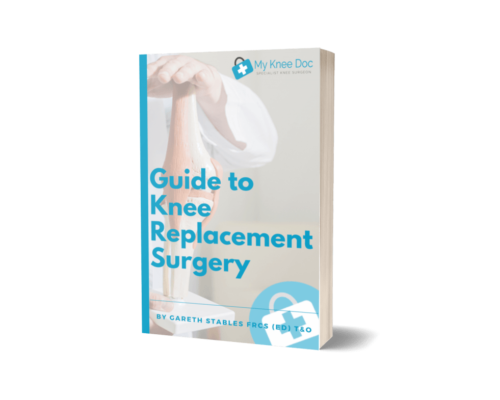How Successful is Knee Replacement Surgery
Knee replacement surgery is the most commonly performed of all joint replacement surgery. In 2018 over 100,000 such procedures were performed in the United Kingdom.
The numbers of patients having knee replacement surgery has increased gradually over the years due partly to improvements in the science of knee replacement surgery, experience of surgeons, and the growing elderly population who wish to remain active into old age. Knee replacement surgery is one of the most successful surgical procedures performed today and patients are generally happy with the results of their surgery.
Is knee replacement surgery for me?
Most knee replacement surgery patients are over 65 years of age. The average age for patients in the UK who had a knee replacement is around 69 years. However over 17% of patients were younger than 50 years old and 2% were over 90 years old! The most common reason for undergoing knee replacement surgery is advanced osteoarthritis, however other conditions such as osteonecrosis (reduced blood supply to bone causing bone death and pain), inflammatory arthritis and injuries (trauma from accidents or sports injuries) may lead to breakdown of the knee joint and lead to the need for knee replacement surgery.
How can I make sure I get the best result from my knee replacement surgery?
Whilst choosing your surgeon carefully is important, the success of your procedure is partly due to your rehabilitation following your knee replacement surgery. To get a good result from knee replacement surgery, you need to engage actively in your rehabilitation and physiotherapy afterwards.
Rehabilitation after your knee replacement starts almost immediately. You will work with a physiotherapist as soon as the surgery has been performed. The key in the early stages of recovery is to maintain a range of motion in your knee and to make sure that you can walk safely. Your body will form scar tissue, which will want to contract. You may struggle recover if you do not focus on bending and straightening your knee according to your surgeon’s and physiotherapist’s instructions.
Your physical therapist will work with you to develop a rehab plan that you can continue with at home or in your local gym. It’s important to follow the physiotherapist’s instructions carefully and not over work your new knee joint or surrounding muscles and tissues while they are healing and becoming stronger.
What can I expect from my new knee?
While successful knee replacement gives excellent pain relief, it won’t give you a normal knee. Most patients are pain-free following their recovery, but some still may have occasional aches and a feeling that it’s not their “own” joint. Most patients can get back to activities; however, high impact activities or running after knee replacement might be more difficult. Kneeling and squatting might be difficult, certainly in the first few months, but as your strength and confidence grows you will hopefully get back doing the things you enjoy, without the chronic pain of knee arthritis.
How long will my new knee last?
The good news is that for most people their knee replacement will last a lifetime.
Some people will need their knee replacements to be re-done (revision surgery). About 6% will need re-do surgery at 15 years, although some may need it sooner if they have problems such as infection or loosening of the implant.
How long does it take to recover after knee replacement surgery?
This is one of the most common questions I get asked in my specialist knee clinic. Each individual patient, however, is different and their circumstances differ significantly.
In most cases, though, a knee replacement patient will be walking with crutches on the day of surgery, gradually increasing how far they can walk and weaning themselves off their crutches over the next few weeks. I tell most patients that the first 4-6 weeks are the most difficult but by the 6 week stage most patients are off their crutches and are beginning to see the benefits of their surgery.
That being said though, it can take anywhere between three and six months after surgery before you are able to return to normal life activities such as work and driving. Most people will continue to see improvements up to 18 months or so after their knee replacement surgery as they gain confidence and strength.
How do I manage my pain after knee replacement surgery?
Good pain management as an important part of the recovery process. You should be taught prior to your knee replacement surgery about how you can help manage your pain, discomfort, and also informed about medication and other pain management techniques. Using these techniques such as regular ice packs and even compression and cryotherapy can help you recover quicker with fewer problems. I recommend the classic Rest, Ice, Elevate and Medicate approach to pain management. There are some great cold therapy devices available now that you can hire that really control the swelling and pain.
How safe is knee replacement surgery?
Your recovery can be slowed by surgical complications following knee replacement. The risk of complications from knee replacement surgery is no greater than in any other surgical operation. You should be fully aware of these possible complications (and their probabilities) before consenting to any surgery. Complications can include blood clots, infection; implant loosening, misalignment of implants and popping, knocking or other noises. You can find out more in my free guide to knee replacement surgery by clicking here.
Although it is not a simple surgery by any means, knee replacement surgery is a procedure with an extremely high success rate. Even so, you should discuss potential complications with your surgeon based upon your overall health before deciding if it’s right for you.
About the author
Mr. Gareth Stables FRCS (Orth)
Cheshire Orthopaedic surgeon, Mr Gareth Stables, is a fully UK trained Consultant Orthopaedic Surgeon specialising in knee surgery. Gareth has the highest qualifications possible for an orthopaedic surgeon in the UK, FRCS (T&O), and is on the GMC specialist register for Trauma and Orthopaedic surgery.
Gareth specialises in; keyhole or knee arthroscopy surgery, ligament reconstruction surgery, knee osteotomy and knee replacement surgery.


